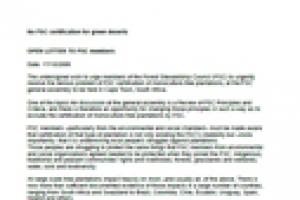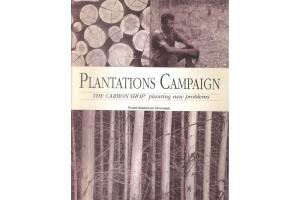This book includes a selection of articles published in the World Rainforest Movement's (WRM) Bulletin on the issue of Forest Stewardship Council certification of tree plantations.
The Green Economy
The Green Economy is a tactic used to “clean up” the image of corporations rather than address corporate capture and capitalism as the true drivers of deforestation. False solutions promoted under the Green Economy include certification, sustainable forest management, ecosystem services, REDD+, the bioeconomy, nature-based climate solutions, and zero net deforestation. Rather than stopping it, these “solutions” support corporate-driven destruction that is causing a deep social and ecological crisis.
Other information
4 September 2001
Bulletin articles
11 August 2001
The process to review, discuss and improve the Malaysian Criteria, Indicators, Activities and Standards of Performance (MC&I) for Forest Management Certification has been subject to disapproval by several Malaysian non-governmental, community based and indigenous peoples' organisations. Though they have been part to the process, they have decided now to withdraw on the grounds that their participation has been somewhat constrained and misconstrued as giving consent and approval to the present MC&I.
Bulletin articles
12 July 2001
The news have reached the entire world: the Kyoto Protocol has been saved! In spite of this information being formally true, it hides the fact that this does not mean that the planet's climate has been saved, which is the real issue at stake. On the contrary, as it now stands, while not solving the problem it was intended to address, the Kyoto Protocol will impose further impacts on local people through the implementation of carbon sink projects.
Bulletin articles
12 July 2001
In July 2001, Thailand’s chief logging agency, the state-owned Forestry Industry Organisation (FIO), received “sustainable management” certification of two teak plantations. Undertaken by SmartWood, a forest management certification organisation that is accredited by the Forest Stewardship Council (FSC), the certification would help solve the agency’s financial troubles as well as cover up its infamous past.
Bulletin articles
12 May 2001
A numerous group of Indonesian NGOs that gathered last April 21st issued a letter questioning the certification of forest concessions in that country, because those concessions are based upon the extinction of native customary (“adat”) rights. They reasonably argue that it is not possible to grant a Forest Stewardship Council (FSC) certificate to a forest concession holder under those circumstances.
Bulletin articles
16 October 2000
Our intrinsic relation with Mother Earth obliges us to oppose the inclusion of sinks in the Clean Development Mechanism (CDM) because it reduces our sacred land and territories to mere carbon sequestration which is contrary to our cosmovision and philosophy of life. Sinks in the CDM would constitute a worldwide strategy for expropriating our lands and territories and violating our fundamental rights that would culminate in a new form of colonialism.
Other information
16 October 2000
The International Institute for Applied Systems Analysis (IIASA), based in Laxenburg, Austria. carried out a detailed study of Russia's biosphere, which contains a fifth of the world's forests. Its report puts in question the whole idea of using carbon sinks as a means of "compensating" for CO2 emissions.
Bulletin articles
16 October 2000
With just five weeks to go before climate negotiators flock to The Hague to hammer out the implementing rules of the Kyoto Protocol, forests are more and more in danger of being reduced to a single commodity --carbon-- to be traded away under the Kyoto Protocol's so called "Flexible Mechanisms".
The resulting "Kyoto forests" are likely to be tree plantations --supposedly a substitute for reducing carbon emissions-- and the implications of these for forests, forest peoples, biodiversity and sustainable development could be grave.
Other information
17 August 2000
Responding to a request of the U.S.-based independent electrical power producer Applied Energy Services Inc. (AES), in 1988 the World Resources Institute identified and evaluated forestry projects to compensate the carbon dioxide emissions of the company's new coal-fired powerplant in Connecticut, expected to emit about 14.1 million tonnes of carbon over its 40-year lifespan.
Other information
17 August 2000
In the last decades several South American countries have been the scenario of the expansion of tree monocultures --basically eucalyptus and pines-- mostly devoted to pulp production. The newly created carbon market can mean a renewed push to further expand this activity, this time with a new or additional purpose. In fact, forestry companies and some governments are very enthusiastic about the idea of using part of the already existing plantations and installing new ones to serve as carbon sinks.
Bulletin articles
17 August 2000
One of the main aims of some industrialized-country negotiators at the Convention on Climate Change is to have plantations accepted as carbon sinks within the so-called Clean Development Mechanism. The reasoning seems quite straightforward: while trees are growing, they take carbon dioxide from the atmosphere and fix the carbon in their wood. They thus act as "carbon sinks" and therefore help to counter climate change by removing carbon dioxide from the atmosphere. So what's the problem then? The answer is: plenty of things.


